Slashed (Oil Apocalypse Book 1) Read online
Page 2
“I know,” she said. “It’s down to maybe ten percent real coffee. I’ll get more next time we’re in town if they have any.”
“No, I should get used to this stuff.” Quinn sat and sipped at the cup of steaming liquid. “It’s good,” he lied.
“Should I put more mint in it, do you think?”
“You’re the expert. Whatever you think.”
“Is Devlin done on the roof? I don’t hear him any more.”
“Near to it, I imagine. If he hasn’t been goofing off.”
“I hate him to be up there alone.”
“He’s fine. He has good balance. I wish he had as good a work ethic.”
“He’s fifteen, Arch.”
“A century ago, boys were men at fifteen, working full-time, starting families.”
“He works plenty. We all do.”
“I know you do.” A stab of worry hit him. “Are you feeling okay?”
“I’m perfectly fine.”
“No more woman problems?”
“Arch, I swear.” She laughed. “You know the real words.”
He did. That didn’t mean he felt comfortable talking about it. The mysteries of women’s interior plumbing quite frankly frightened him. He had vomited after watching Dev’s birth, but out of sight of Kelly, thank God. “You’re sure you’re okay?”
“I’m fine. The herbal medicine did the trick.”
“I hate that there’s no doctor in town any more.”
“The nurse practitioner knows her business.”
“I guess.”
“And you keep saying worse is coming. We’ll have to be our own doctors soon enough. All we’ll have is herbs and what we’ve stockpiled.”
“That’s a fact.”
“So at least I’ve learned something new from her. I ordered some seeds for that herb and soon it’ll be part of the garden. I might need to pass it on to someone else twenty years from now.”
“I hope we’re still around twenty years from now.”
“Can’t speak for you, but I’m not going anywhere.”
He dearly hoped not. He’d be lost without her. “Good,” he said.
“Go watch while Devlin comes off the ladder, would you? Hold it for him.”
He held his breath to blunt the taste while he finished his fake coffee. He pushed back from the table. “We need to talk about Devlin and girls and getting him into town. Tonight, when work is done, we’ll discuss it.”
“I’d like that,” she said.
“I’ll go out and make sure he doesn’t fall. And make sure he knows his next chore is cleaning the chicken coop.”
“Thank you,” she said.
As he closed the back door, he heard the radio come back on.
Chapter 3
The next morning, the radio and internet were full of more bad news about the war. There’d been another act of sabotage on an offshore Saudi drilling rig, the fifth in as many weeks. The flames on the water in the evening twilight looked eerie in the news clip Arch watched on his phone. It was unnatural, as if the water itself was burning. Black smoke billowed out and was lost to the deepening night half a world away.
The diplomatic language in response to the day’s events made it seem as if the U.S. and Russia were poised on the edge of stepping in to the war. Even the White House press secretary spoke about the importance of Saudi Arabia’s oil in a way that made Arch Quinn think that gas rationing would be coming soon. He had spare diesel for his truck in a tank behind the shop, a tank he’d disguised poorly by building a shed around it, which Kelly said made it look like an outhouse. But the next trip into town, he’d make sure he topped up the tank. And he and Kelly would stock up on everything they might need. Top off everything. Buy all the coffee there was to be had, even if it cleaned out their savings. Not to drink, mind you. To hoard. He might need it to trade in the future.
Take money out of the bank but the bare minimum, five thousand, or whatever the bank had raised the bare minimum to last time. He’d buy more spices, all the sugar he could store. Luxury goods would be better than cash when the shit hit the fan. Or maybe he should close the bank account. It was hard—impossible—to know when the banks were going to fail forever and it was impossible to function without a bank account. They’d weathered two bank failures in the past twelve years but the government had made good the losses. Could be the next time they wouldn’t be able to back their guarantees.
He’d check at the junk yard for lead and cast more slug loads for the 12-gauges. Bear loads, he called them to Kelly, but she knew well he was less worried about the black bears emerging from the forest than about desperate people coming up the road one day.
You never knew when the end would begin. That was his philosophy. Pretend it might be tomorrow, and prepare all you can today. Have as much as you can imagine you’ll need in the worst case scenario, plus 20%, because the worst case you can imagine might not be bad enough.
And it was time to talk to Crocker again about prepping better. Arch wanted them to train together. And he wanted to be ready to tap the stream if needed. Maybe after hearing the news from this morning, Crocker would be more reasonable.
He was in his garden, hauling water from his rain barrels in five-gallon containers.
“How’s the garden?” Arch asked him.
“Take a look. It’ll be a good year, I think.”
“Here, let me take a bucket.”
“Nah, I’m balanced with the two.”
“I’ll get that barrel lid for you then.”
“Much appreciated.”
Arch glanced down into the rain barrel. The water level was low. “This your last one?”
“No, another’s full. And we’re only three months out from the first monsoon rain.”
“Unless we have another dry summer.”
“I think it’ll be fine.”
That was one of the man’s problems. He always thought good things would happen, not bad. What if the geography of the monsoon had shifted permanently? Three out of the last seven summers had been dry ones. There’d been some winter rain to make up for it last year, but they couldn’t count on that again. Snow in the elevations wasn’t even certain. But whatever snow there was melted, and it fed the stream that ran along their dirt road, out of the mountains, through the national forest, and past all four properties. They weren’t the first private properties the stream ran past, but they were close to it. The higher parts of the stream were on federal land, so they were among the first who had easy access to the water in it.
He watched Crocker tip the bucket into the culvert he’d dug at the high end of the first row, of tomato plants thick with bloom. He poured slowly and carefully, and the water trickled down past the green fuzzy stalks, soaking into dirt, turning light brown to dark.
Best to start with something positive, right? A compliment. That’s what Kelly always told him. “You have good soil.”
“I should. I’ve worked hard enough at it. Compost every year and green compost it in the winter. I’ve been at improving the soil for almost as long as Sierra has been alive.”
“She doing well? Your daughter?”
“Very well. And how’s Dev? He’s a good kid.”
“Fine. Just fine.” He cleared his throat. “You know, I watch you hauling water like this, and I can’t help but think.”
Crocker’s head jerked up and he made eye contact. “You’re not going to bring up the stream again, are you?”
“Well, yes. I am.”
“Quinn, you know that it’s illegal to use that stream for irrigation.” He moved to the next row in his garden.
“I haven’t seen a lot of law enforcement by here lately. They’ve had budget cutbacks, so I doubt we will see them often.”
“It’s not about getting caught. It’s about there being a good reason for such laws.” When he poured the second bucket, he wasn’t nearly as slow or as careful.
“It’s about survival.”
“We’re both sur
viving. We’re thriving. Compared to people who live in Africa—”
“I don’t know any people in Africa. I know you and the Morrows, and Curt Henry up the road. We all of us might need that water.”
“Do you need it? Right this second?”
“Not right now, no. The well is still working. But we might need it if it’s another dry summer. And when electricity goes off, hand pumping every bucket we put on our gardens is going to be a lot of work. And one day the water table might drop and our wells will be useless.”
“We make our own electricity, all of us. Hard for it to go off. Let’s say it does though. Let’s say it’s a cloudy year but without rain, and your electricity production is low. Or it’s sunny but dead still, so mine is low. In that case, we’ll do the work. Work hasn’t killed us yet. We each have a healthy kid old enough to do their share of pumping and carrying water.”
“But if we dug irrigation ditches now, to be ready—”
“We’re not going to tap into that stream.”
“We don’t need to yet. I get that. Just have the system laid in, ready in case we need to.”
“That’s a lot of work for no return. What if it’s eight years before we need water? The ditches will be filled in again.”
“I have concrete irrigation pipe stored in the shop. We can lay them and cap them off. Then they’d be there. I only have enough for my property, but we’re going to town later on today. I could check to see if there’s any to be had for you. With Dev working full-time on it, we can get it done in a week.”
“I don’t want any pipe.”
Arch blew out an exasperated breath and tried to calm himself. He needed the cooperation of everyone on the road to do this. Otherwise, one of them would rat the others out. And Crocker was going to be the holdout, so it made sense to start with him. If he could get him on board, everyone else would fall in line. “Did you hear the news this morning?”
Crocker picked up his empty buckets and headed back to his rain barrels. “I did.” He sounded grim. “I’m worried about the Russians.”
“So am I,” said Quinn, surprised to find a point of agreement.
“I’m worried for my kid. Hate to say it, but I’m glad remote war technology has gotten so good. At least she won’t be drafted for a ground war.”
“Here, let me tip that barrel for you.” He pushed the barrel to the tipping point and held it by its rough rim so it didn’t fall while Crocker dipped more water.
“When we had her—Theda and me—we started a college fund for her. But going away to college, all that. It was never in the cards for them—not my kid, not yours.”
“No. Not any more, not for people like us. Not that it would do them much good anyway. There aren’t so many jobs to be had. Maybe nuclear plant jobs, biodiesel manufacture, that kind of thing. Otherwise, might as well have no college and save the money.”
“I wish I knew how to advise her. I don’t want her to have to do agricultural work.”
“That’s what you’re doing right now,” Arch pointed out.
“I choose this. I enjoy it most of the time. And it’s different doing this in your own yard than picking acres of commercial produce for four dollars an hour and their discards. I want better for her. I want her to have a whole world to choose from.”
“It’s not that America any more. Not the world you and I grew up in. Not the one our parents had and didn’t appreciate enough.”
“I know.” Crocker grunted as he lifted the buckets and carried them to his garden.
“I’m not saying we need to tap into the stream right now,” Arch said, trailing along after his neighbor. “I’m just saying we might need to.” All he needed was a yes to something, and it’d be like putting the tip of a crowbar in.
“I want to wait for that need before we start disturbing the soil. When we’re thirsty, I’ll be right by your side, shovel and pick in hand. But not now.”
“You’re a stubborn man.”
“I can’t hold a candle to you on that. What’s this, the fifth or sixth time you’ve brought this up in the past few years?”
“And I’ll keep bringing it up until I can talk sense into you.”
“I have sense,” Crocker said. “I understand the ecological balance. I understand what the stream does for every one of the creatures—”
“Don’t give me that liberal nonsense.”
“It’s not nonsense. It’s basic biology. Bio 101. You screw up the balance of nature, you end up screwing yourself.”
Arch always felt Crocker was lording it over him, having had more formal education, when he talked like this. “I’m part of nature too, you know.”
“Not the most important part.”
“Of course I am!” Arch lost control. “And you’re the most important part to you, you and your daughter and your girlfriend.” Out of the corner of his eye, he saw the old Crocker dog get up, looking leery, his head lowered as if he was thinking about joining in this argument. Arch lowered his voice. “Christ, Crocker, you’re impossible to talk to.”
“I thought you weren’t supposed to take the Lord’s name in vain or whatever.”
He pushed a finger into Crocker’s face. “Do not make fun of my religion.”
“Then don’t make fun of mine.”
“Tree-hugging is not a religion.”
“Of course it is, you—” Crocker bit off whatever he was going to say.
“You what?”
“Kind friend and neighbor,” Crocker said, but he said it through gritted teeth.
“I’m not done with this topic.”
“Sorry to say that I’m sure you’re not.”
“You’ll see sense one day,” Arch said. “You’ll see I was right.”
“And on that day, I’ll dig ditches until my hands bleed. But up until that day, I have a garden to water and bearings to grease and a rubber gasket to replace and a whole list of chores to accomplish before sunset.”
Arch turned his back on the man and marched back to the road, then down the road to his property, the closest to the main road, one corner of his property in fact cut off by the bend in the road. He had an acre and a half less land than Crocker because of that, and right that moment, this irked him too.
Damned hippie.
And he hadn’t even been able to broach the issue of firearms training.
*
Pilar had no idea why Quinn wouldn’t see reason. Why do destructive work like that when it wasn’t necessary? They were on a shared well, all four households on the road. They all had sources of energy, like the Quinns’ big solar array and Pilar’s own windmills. They’d both added a hand-pump backup to their wells several years ago, though they hadn’t had to use it but a couple times. Pilar had even shared his plan for that with Quinn—taken off one of those hippie-holdover websites Quinn disdained.
He shook his head. They said you were stuck with the family you had, but that was no less true of being neighbors on a rural road like this. The Morrows were lovely people, a pair of retired professors with plenty of money. Curt Henry up at the innermost property on the gravel road—the highest one, almost all wooded—was a cipher, and Sierra was a little frightened of the man, but Pilar himself had never had problems with him. He was a hermit, was his only problem, but that seemed to Pilar like the man’s right to be anti-social if he wanted.
After an interaction like this morning’s with Quinn, Pilar thought being a hermit might not be such a bad idea.
For some reason, his thoughts slipped back to Theda, his first—and only—wife, and their time together on the land. They’d been young, with a new baby, and excited about off-the-grid living, when it only seemed like a good idea, not a necessity. And then one day, Theda had announced she was done. Leaving. Going to southeast Asia, of all places. Leaving Sierra with him. “You’re the more stable one anyway,” she’d said. And within a month of the announcement, and despite his pleas, she was gone. Sierra heard from her about twice a month, but sometimes that
was only a text if Theda wasn’t somewhere with better access to communication. She worked on communal farms, she went to ashrams or whatever they were called, and sometimes she was out of contact for a month at a time. Theda. He sighed.
He didn’t like Quinn any more than Quinn liked him, but he’d say this for the man. He couldn’t imagine him ever walking away from his family like that.
It has to be me. Something is wrong with me.
He was losing Lisette too. That was clear. He didn’t really understand why, but he had some mysterious talent at driving women away.
“Hey, Bodhi, come here, buddy,” he said, his knees popping again as he squatted to the dog’s level. Bodhi ran over, tail wagging, and leaned against him. Pilar ran his hands along the dog’s head and ears, rubbing them just the way the dog liked it. “You like me, don’t you, buddy? You won’t leave me?”
No, Bodhi said with his insistent leaning and joyous expression. I won’t leave you.
Chapter 4
The men’s voices had been raised enough that Dev had heard part of the exchange. He wasn’t sure why his father was such a hard man, but he was. Dad often said that Pilar Crocker was nuts, but Dev thought his father was maybe 10% more nuts than Sierra’s dad. More likely to start an argument anyway, if that’s what it meant to be nuts.
He was hard on Mr. Crocker, but he was hardest of all on his son. Dev wondered if he’d ever live up to his father’s expectations of him.
“Devlin?” His mother’s voice came from the porch.
“Yeah?” Dev rested on his hoe. He hated weeding the garden this early in the year. It was easy to knock over a plant you wanted to keep, so it was fussier work right now than it would be in a month.
“Can you run over to the Morrows and ask Mitch if they need anything from town this afternoon?”
They were going to town? “Can I go this time?”
“You’ll have to check with your father. He may want you to stay here and take care of the place.”
“Okay. I’m putting the hoe away, then I’ll go.”
He stayed in the shed straightening tools until he heard his father come up the gravel drive, not wanting to pass him when he was in a bad mood, as he usually was after arguing with the neighbor. When the back door to the house slammed, Dev scooted out, down the drive, and out to the private gravel road they shared. He passed the Crocker place. The windmills were visible from the gravel, but the house wasn’t because of a patch of pine trees between the road and house. No chance of catching sight of Sierra from here.

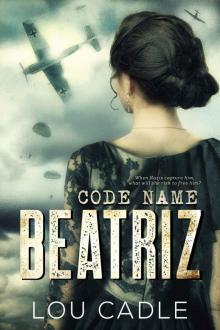 Code Name- Beatriz
Code Name- Beatriz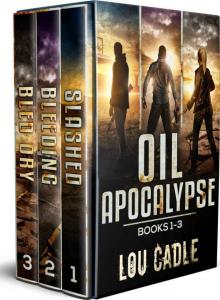 Oil Apocalypse Collection
Oil Apocalypse Collection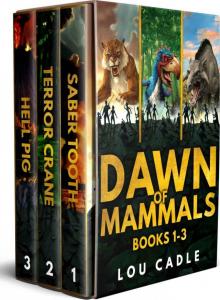 A Dawn of Mammals Collection
A Dawn of Mammals Collection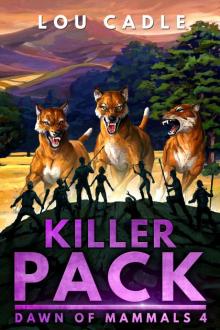 Killer Pack (Dawn of Mammals Book 4)
Killer Pack (Dawn of Mammals Book 4)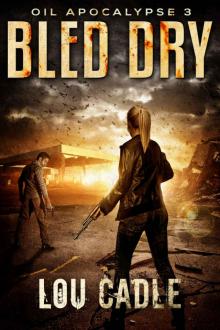 Bled Dry
Bled Dry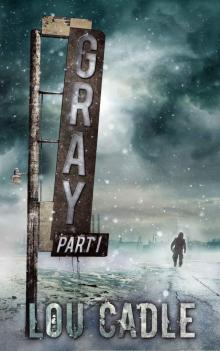 Gray (Book 1)
Gray (Book 1) Dawn of Mammals (Book 4): Killer Pack
Dawn of Mammals (Book 4): Killer Pack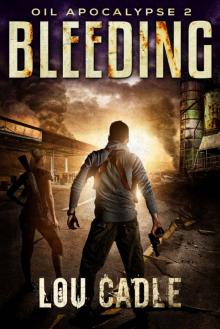 Bleeding (Oil Apocalypse Book 2)
Bleeding (Oil Apocalypse Book 2)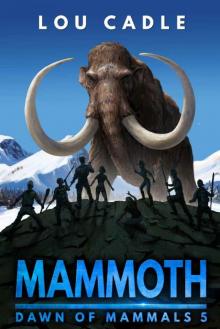 Dawn of Mammals (Book 5): Mammoth
Dawn of Mammals (Book 5): Mammoth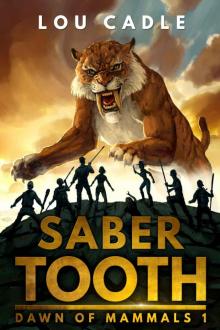 Saber Tooth (Dawn of Mammals Book 1)
Saber Tooth (Dawn of Mammals Book 1)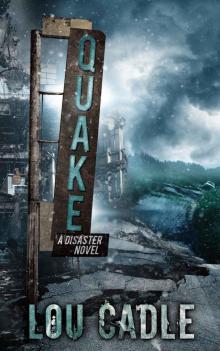 Natural Disaster (Book 2): Quake
Natural Disaster (Book 2): Quake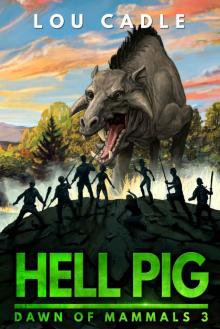 Hell Pig (Dawn of Mammals Book 3)
Hell Pig (Dawn of Mammals Book 3)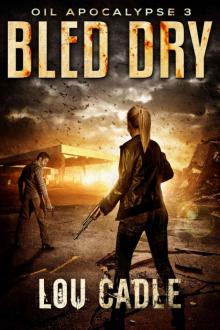 Bled Dry (Oil Apocalypse Book 3)
Bled Dry (Oil Apocalypse Book 3)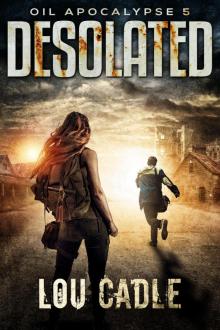 Desolated
Desolated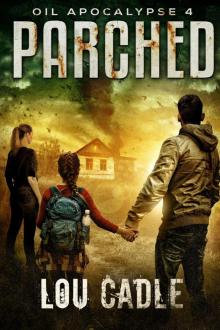 Parched
Parched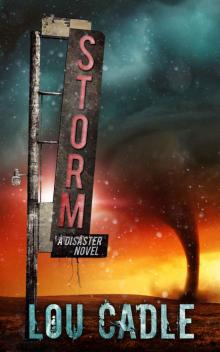 Natural Disaster (Book 3): Storm
Natural Disaster (Book 3): Storm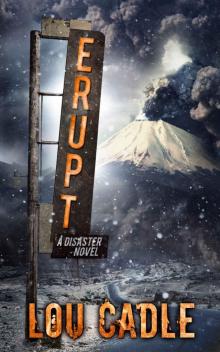 Natural Disaster (Book 1): Erupt
Natural Disaster (Book 1): Erupt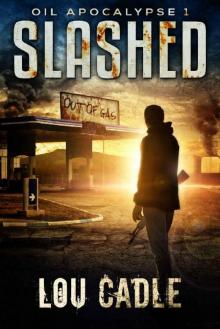 Slashed (Oil Apocalypse Book 1)
Slashed (Oil Apocalypse Book 1)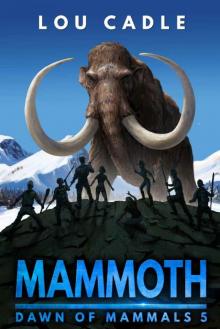 Mammoth (Dawn of Mammals Book 5)
Mammoth (Dawn of Mammals Book 5)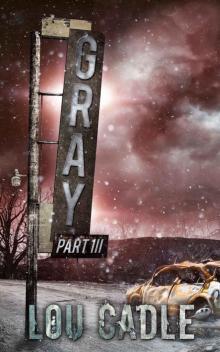 Gray (Book 3)
Gray (Book 3)